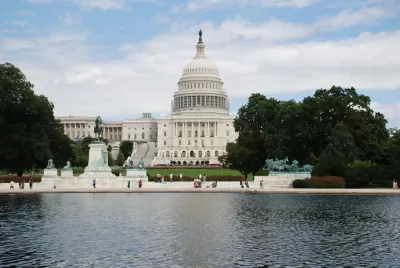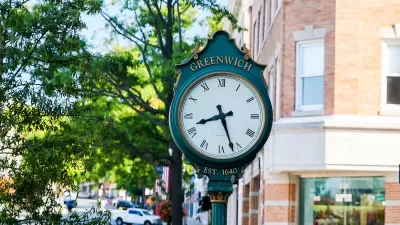Aid dollars not yet distributed to states and cities could be part of a Congressional ‘clawback,’ prompting concern from local leaders.

Some funds directed to local governments as part of the $1.9 trillion American Rescue Plan Act (ARPA) could be rescinded as part of Congressional negotiations to raise the debt ceiling, raising concerns among state and local leaders. As Kery Murakami reports in Route Fifty, local leaders say the move to take back funding still in the Treasury Department’s possession could lead to an erosion of trust between officials at different levels of government.
“Detroit Democratic Mayor Mike Duggan, for instance, urged other mayors at a meeting of the U.S. Conference of Mayors last month to quickly spend the money before it could be taken away,” although a House aide clarified that no funding already distributed to local governments would be taken back. “According to a Brookings Institute tracker, the nation’s 329 largest local governments in the country had budgeted 67.8% of the $44 billion of their ARPA funding they’re due to receive.”
Denise Winfrey, president of the National Association of Counties, says the ARPA funding isn’t as extraneous as some lawmakers might think. “Before that money, we weren't able to give the breadth of services or the depth of services that we needed to and there was a constant demand.” Today, the need has only grown.
FULL STORY: Local Governments Still Counting on Pandemic Aid Despite Clawback Threat

Planetizen Federal Action Tracker
A weekly monitor of how Trump’s orders and actions are impacting planners and planning in America.

Maui's Vacation Rental Debate Turns Ugly
Verbal attacks, misinformation campaigns and fistfights plague a high-stakes debate to convert thousands of vacation rentals into long-term housing.

San Francisco Suspends Traffic Calming Amidst Record Deaths
Citing “a challenging fiscal landscape,” the city will cease the program on the heels of 42 traffic deaths, including 24 pedestrians.

Amtrak Rolls Out New Orleans to Alabama “Mardi Gras” Train
The new service will operate morning and evening departures between Mobile and New Orleans.

The Subversive Car-Free Guide to Trump's Great American Road Trip
Car-free ways to access Chicagoland’s best tourist attractions.

San Antonio and Austin are Fusing Into one Massive Megaregion
The region spanning the two central Texas cities is growing fast, posing challenges for local infrastructure and water supplies.
Urban Design for Planners 1: Software Tools
This six-course series explores essential urban design concepts using open source software and equips planners with the tools they need to participate fully in the urban design process.
Planning for Universal Design
Learn the tools for implementing Universal Design in planning regulations.
Heyer Gruel & Associates PA
JM Goldson LLC
Custer County Colorado
City of Camden Redevelopment Agency
City of Astoria
Transportation Research & Education Center (TREC) at Portland State University
Jefferson Parish Government
Camden Redevelopment Agency
City of Claremont





























